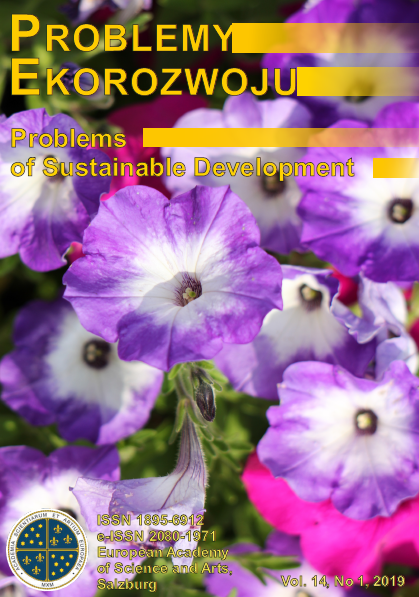ADAMIŠIN P., VAVREK R., 2015, Analysis of the links between selected socio-economic indicators and waste management at the regional level in the Slovak republic, in: 5th Central European conference in regional science – Conference proceedings, p 1-9.
ANDERSON D. A., 2010, Environmental economics and natural resource management, Routledge, Abingdon.
BALLINGALL J., STEEL D., BRIGGS P., 2003, Decoupling economic activity and transport growth: the state of play in New Zealand, AT RF 03, New Plymoth.
BLEISCHWITZ R., 2012, Towards a resource policy unleashing productivity dynamics and balancing international distortions. Wuppertal Institute for Climate, Environment and Energy, Wuppertal.
CHOVANCOVÁ J., RUSKO M., 2008, The application of environmental indicators in environmental reports of companies, in: Environmental management for education and edification, 5(1), p. 18-25.
DE BRUYN S. et al., 2009, Resource productivity, competitiveness and environmental policies, CE Delft, Delft.
DRASTICHOVA M., 2017, Decomposition Analysis of the Greenhouse Gas Emissions in the European Union, in: Problemy Ekorozwoju/ Problems of Sustainable Development, 12(2), p. 27-35.
EC, 2010, Europe 2020 – A strategy for smart, sustainable and inclusive growth, COM, Brussels.
EC, 2011, Analysis associated with the Roadmap to a Resource Efficient Europe.COM, Brussels.
EU, 2013, Decision No 1386/2013/EU of the European Parliament and of the Council of 20 November 2013 on a General Union Environment Action Programme to 2020 Living well, within the limits of our planet, EU, Brussels.
FINEL N., TAPIO P., 2012, Decoupling transport CO2 from GDP, Finland futures research center, Helsinki.
HUTTMANOVÁ E., 2011, Národohospodárstvo, Vydavateľstvo Prešovskej univerzity v Prešove, Prešov.
HUTTMANOVÁ E., ADAMIŠIN P., CHOVANCOVÁ J., 2013, Assessment of the current state of environment in the Slovak republic with the use of green growth indicators, in: Ecology, economics, education and legislation: conference proceedings, volume II: 13th international multidisciplinary scientific geoconference SGEM 2013, p. 133-140.
KOTULIČ R., ADAMIŠIN P., 2012, Economic Effects of the Foreign Direct Investments Management on the Development of Slovak Regions, in: Conference proceedings Valtice, 15th International Colloquium on Regional Sciences, p. 288-295.
MARZIO G., 2003, Environment and Economic Growth: Is Technical Change the Key to Decoupling?, in: Social Science Research Network Electronic Paper Collection, p. 21.
MUDGAL S. et. al., 2010, Preparatory study for the review of the thematic strategy on the sustainable use of natural resources. Final report for the European Commission, Paris.
OECD, 2014, Economic policies to foster green growth, http://www.oecd.org/greengrowth/greeneco (26.06.2018).
STEGER S., BLEISCHWITZ R., 2009, Decoupling GDP from resource use, resource productivity and competitiveness: a cross-country comparison, in: Bleischwitz, Raimund (Hrsg.): Sustainable growth and resource productivity: economic and global policy issues, p. 172-193.
STOENIOU C. E., 2018, Pattern of Energy Productivity and Gross Domestic Product Among European Countries, in: Problemy Ekorozwoju/ Problems of Sustainable Development, 13(2), p. 113-123.
TAPIO P., 2005, Towards a theory of decoupling: degrees of decoupling in the EU and the case of road traffic in Finland between 1970 and 2001, in: Transport Policy, 35, p. 137-151.
UNEP, 2011, Decoupling natural resource use and environmental impacts from economic growth, https://wedocs.unep.org/handle/20.500.11822/9816 (25.06.2018).
UNEP, 2014. Green economy – What is GEI?, http://www.unep.org/greeneconomy/AboutGEI/WhatisGEI/tabid/29784/Default.aspx (25.06.2018).
VEHMAS J., LUUKKANEN J., KAIVO-OJA J., 2007, Linking analyses and environmental Kuznets curves for aggregated material flows in the EU, in: Journal of Cleaner Production, 15, p. 1662-1673.
VELKIN V. I., SHCHEKLEIN S. E., 2017, Influence of RES Integrated Systems on Energy Supply Improvement and Risks, in: Problemy Ekorozwoju/ Problems of Sustainable Development, 12(1), p. 123-129.
WIEDMANN T. O. et. al., 2013, The material footprint of nations, in: Proceedings of the National Academy of Sciences 112(20), p. 6271-6276.
ŻELAZNA A., GOŁĘBIOWSKA J., 2015, The Measures of Sustainable Development – a Study Based on the European Monitoring of Energy-related Indicators, in: Problemy Ekorozwoju/ Problems of Sustainable Development, 10(2), p. 169-177.



